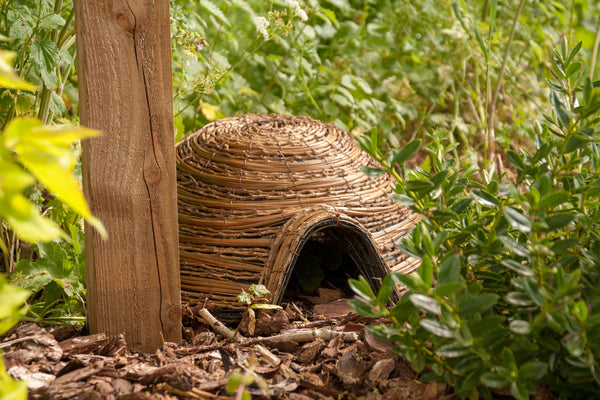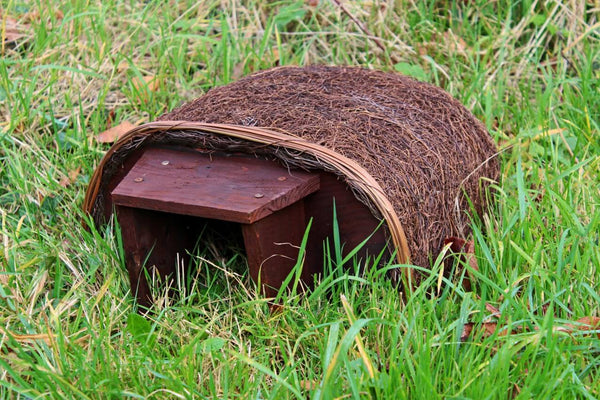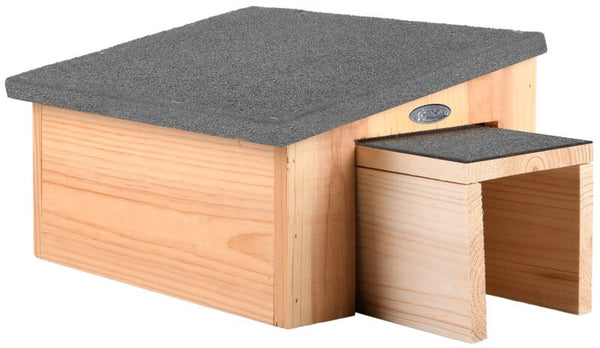Where do hedgehogs live?
Hedgehogs - one of the sweetest and most beloved creatures in the UK, they've attained a beloved and, presumably, much-coveted spot as one of the peoples' favorites. With the widespread adoration for hedgehogs out there in the world, we want to run through some key facts about hedgehogs, their habitat, and how we can help these spiky little friends as well as possible.
We're going to focus on habitat, where hedgehogs live, and how we can move them around in this article. As part of that, we will focus on a few related things, but this article's main focus is habitat.

European Hedgehogs
The European hedgehog is the name of the UK's native hedgehog, which you might have spotted sniffing around in your garden. Native hedgehogs hugely benefit the environment they live in since they can engage with it on a micro scale, from insects to plant fibers to a macro scale, fending off larger creatures like badgers or foxes in some extreme examples.
The European hedgehog is entirely nocturnal, which means that you're probably a little more likely to see holes and droppings than you are to see the hogs themselves. They are known to be loud, though, grunting and snuffling around readily.

Hedgehogs typically spend their time in the nest, with wild hedgehogs happily creating their own nests from leaves, twigs, and similar bits of forest floor detritus. They're often attracted to piles of refuse in gardens, from tree trimmings to dry compost heaps.
Hedgehogs Hibernate
Hedgehogs are a little notable compared to some other animals that live in the same world as them since hedgehogs tend to hibernate during the winter. It's common to see small mammals doing this, but considering the fact that their predators typically also hibernate, it seems like an odd instinct to develop.
Hedgehogs hibernate through the winter, as we just said, with them typically popping out of their burrows for the first time somewhere in the breeding season - between April and September.
Feasting
Before hibernating, small mammals typically go through a period of eating a lot to build up fat reserves that allow them to survive through a long period of not eating. This might occur through the hogs munching their way through insects in your garden, or it could take the form of leaving out dog food or hedgehog food for them - it's one of their favorite snacks if they find it lying around.
From the desert hedgehog and African hedgehogs to hogs throughout the UK, they love to munch on insects. UK species love to eat slugs, so throwing a few of those their way could be beneficial for your veg crop and their stomachs.

Hedgehog Habits
Hedgehogs have a number of small habits that make it a little more understandable to consider where they're liable to live. A hedgehog will typically pop out of its den at dusk or shortly thereafter to be under the cover of darkness.
Coming out after dark means they don't have to worry about the sun's heat, and they won't be afraid to cross surfaces such as metal or plastic that may get hot in the daytime. Consider this when thinking about paths hogs might take in your garden.
Another smaller habit that hedgehogs have is the same as a habit that most different species of small animals have - they tend to stay in cover. They're usually very happy to find their way to a place where there's some kind of overhanging tree or shrubbery.
Being under cover helps them feel safer from predators, especially birds that may swoop down in an attempt to scoop them up and carry them away. Providing a little cover can be helpful to give them some more space in your garden.

How to help hedgehogs in your garden
The primary way to help hedgehogs in your garden is through their diet, hedgehogs are often at a loss for handy food sources, and you're usually well-placed to help them out.
In this article, we want to focus on habitat and how you can help with that.
If your garden has destroyed some measure of their native habitat in the area, we would suggest looking into purchasing or making a hedgehog house. Typically, they're quite inexpensive, and hogs will keep the space fairly clean - they're not dirty animals by any means.

To attract hedgehogs to your garden or new hedgehog habitat, we'd suggest putting out some dry food for them and some water. Be sure not to put out milk since they're all lactose intolerant. For a small creature, lactose intolerance can pose a real danger.
What to do if you find a hedgehog in a bonfire or another unsafe spot
Bonfires, typically, are erected and lit on the fifth of November in the UK. This is the time at which hogs are likely to be looking for a safe, dry spot to hibernate
Whether you've got a native hedgehog or a different species like Asian hedgehogs in your bonfire, you need to check for them before the fire is lit. Fires collapse during burning, so they're unlikely to escape.

For that reason, we'd suggest taking a hedgehog out of your unlit bonfire with a pair of thick gloves to protect against their spines. After that, place them in the undergrowth or shrubbery nearest the bonfire - that's likely where they came from, and they should be able to find their way from that spot.
Hedgehog Offspring
Hedgehogs will typically have their offspring within the nest that they construct. This means that any species, Asian hedgehogs and the four-toed hedgehog included, will typically have a nest with a baby hedgehog and adult hedgehog at some point during the breeding season.

To best care for their habitat needs, you only need to provide them with extra food and water. Hedgehogs are happy to dig and expand their nest a little on their own, though they might be tired off the back of it - providing some extra food could be just what the doctor ordered.
Are hedgehogs endangered in the UK?
Interestingly, no. Since their number has largely declined in recent years, many people do presume that the hogs are endangered. Thankfully, this isn't the case.
These things are typically judged by the rate at which a species is dying off. At present, hedgehog numbers are stable, meaning that hogs aren't truly endangered in the UK. This is a source of comfort to us and, we're sure, to you, too.
The Relationship Between Diet and Habitat
The relationship between diet and habitat is interesting since it's much the same as the human relationship between work and home. A human will travel to secure a job and think of habitat second, to some extent. Hogs are much the same!

Typically, hedgehogs will be happy to seek out food off their own back since they can sniff it out and find something wonderful. Therefore, if you offer food for them, you can expect to have some hogs sooner or later.
What you can offer

If you have managed to attract hogs, we would ensure you've got some hedgehog habitat available. Whether you've invested in a hedgehog house for them, or if you've simply got a small pile of sticks and chicken wire that they might like, anything is better than nothing. They will certainly appreciate that habitat. You get bonus points for throwing garden pests their way, though, which is certainly worth thinking about to get in their good books and establish yourself as a safe home for hogs.
How far can hedgehogs travel?
Hedgehogs can travel for up to tens of miles every single night. Their little legs can scoot them along quite quickly, which is why some importance has historically been ascribed to watching out for hogs on roads. Hedgehogs survive, really, through being able to wander and find themselves some food.
If they wander, that's fine - it's part of their nature. If you've been able to establish yourself as a safe nest spot for them, then you're likely a little better off, too - they'll wander and then return.
How do hedgehogs protect themselves?
Hedgehogs use their spines and their habitat to protect themselves. The African Wildlife Foundation reports that a hedgehog can have up to six thousand spines, which is a handy way for them to take care of themselves.
More often, though, they'll run to the safety of their burrow/nest and use the small size to protect them from their larger predators. We used the example of hogs hiding under the shade that shrubbery provides earlier, and that still rings true. Another great example is the use of a hidey-hole to protect them from larger animals, such as foxes, that wouldn't be able to wiggle their way in.
What's the rough size of a hedgehog?
Hedgehogs are generally around twenty-five centimeters long, with their chubbiness varying as they stretch and squish themselves, similar to how a cat can be fatter or slimmer depending on how stretched out it is.
This size means that their winter nest will typically be a small chamber only a little larger than theirs. While their breeding season nest will be quite large, allowing for themselves, a mate, and several piglets. Bear this in mind if you have hogs in a hog house - they may relocate to hibernate since they don't need as much space.
Where do hedgehogs live in the garden?
Hogs can live in all sorts of spots, but they prefer to live in dry places where they've got cover on all sides. A great example of this could be a pile of sticks and twigs or a dry compost heap.
What can hedgehogs live in?
Hedgehogs can live in nearly anything - they're small, omnivorous, and wildly adaptable. They prefer dry places, but they can live under sheds and outbuildings or even within those buildings if the need arises.
If you find a hog that's living within an outbuilding that you own which is a little on the damp side, it's likely that they picked that spot as the best of a bad batch. Consider getting a hog house or offering up space such as a dry compost heap or a stack of logs for them - they'll prefer something more natural, like those options.
Where do hedgehogs stay in the day?
During the day, hedgehogs will almost always stay within their nest and sleep. They're nocturnal animals, meaning that they rest during the day and go out for food at night.
If you're very quiet and gentle, you may be able to sneak a peek of a hedgehog within their nest during the day. Be careful not to disturb them - they're liable to abandon their nest.










